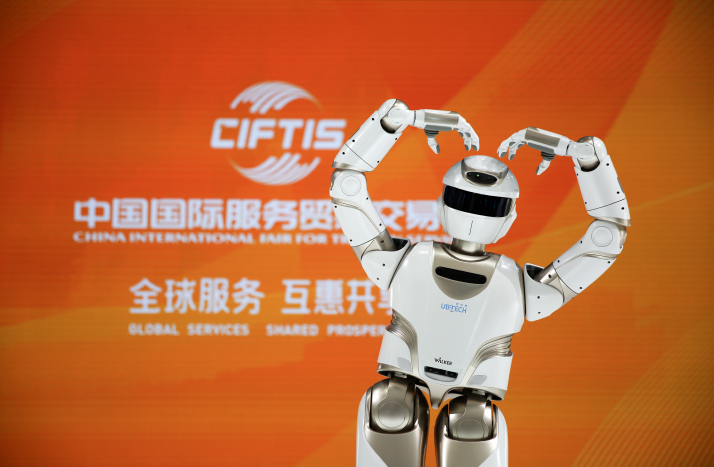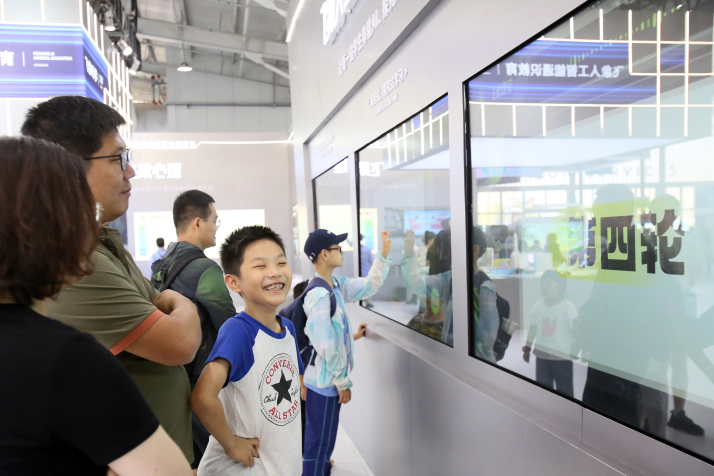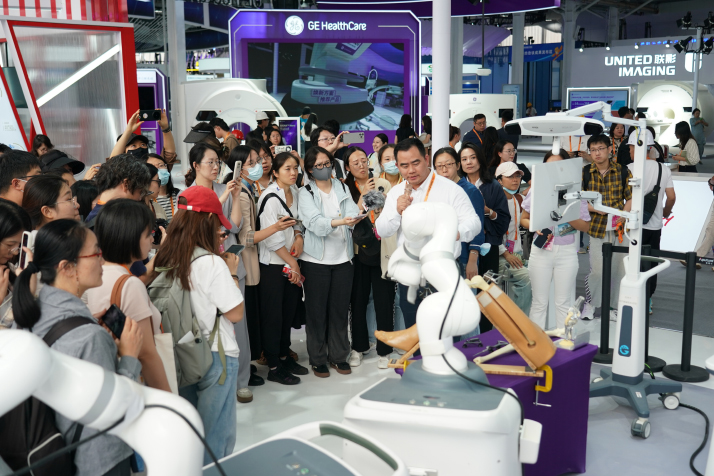| China |
| How AI weaves innovation into everyday life | |
|
|
 An intelligent robot delights the audience by making a heart gesture at the 2024 China International Fair for Trade in Services (CIFTIS) in the China National Convention Center in Beijing on September 12 (XINHUA)
At the 2024 China International Fair for Trade in Services (CIFTIS), Lu Xiaodong, a staff member working at the booth of mobile payment platform Alipay, addressed a screen in front of a small crowd of visitors. "I'm looking for a job as a waiter," he said. Instantly, a list of relevant job openings appeared on the screen. "Please show me positions with a salary above 4,000 yuan ($564)," he continued, and the job listings were immediately filtered. He selected one position and inquired further about the job's location and working conditions, all of which were answered by the digital assistant Xiao Gu. Satisfied with the responses, he used facial recognition to apply for the job and quickly received a confirmation text message. Shortly after, he received an artificial intelligence (AI)-powered voice call asking about his work experience and other details. Based on this information, the system automatically drafted a resume and sent it to the employer. Lu was talking to Alipay's public employment AI solution, unveiled at this year's CIFTIS, held in Beijing from September 12 to 16. Known as Xiao Gu, it integrates advanced capabilities such as AI large language model, digital human, smart voice calling and facial recognition for job applications. By responding to users' voice commands, it enables intelligent job matching, job browsing, application submissions and resume updates. According to the Beijing Municipal Commerce Bureau, this year's CIFTIS placed an emphasis on new quality productive forces, with a focus on "new and specialized" industries. It served as a platform to highlight China's latest achievements in the digital transformation, intelligent technologies and sustainable development within the services trade sector. AI is one of the key industries that exemplifies innovation and specialization. Xiao Gu is just one example of how AI is transforming the job market. At this year's CIFTIS, it was clear that AI has made its way into nearly every sector, driving innovation and growth across industries. As these technologies take root, they're increasingly enhancing daily life in tangible ways. Digital 'interviewer' According to Alipay, the intelligent terminal is already in use across multiple regions, including Chengdu and Yibin in Sichuan Province, Tianjin Municipality, and Foshan in Guangdong Province. It's being implemented in industrial parks, gig economy platforms, employment service centers and residential communities. To date, it has assisted over 100,000 job seekers, with a 99-percent accuracy rate in responding to inquiries. Its job matching efficiency is more than 10 times faster than traditional manual methods. "At present, college students and blue-collar workers are the main target service groups for Xiao Gu," Lu told Beijing Review. He said the job market is flooded with excessive and disorganized information, making it difficult for them to make informed choices. By collaborating with local governments' employment service agencies, Xiao Gu is able to provide reliable and secure job listings. The AI-powered solution not only reduces the burden on job seekers by filtering information and drafting resumes but also enables fast and precise matching between candidates and positions, improving both the quality and efficiency of recruitment, he added.  A visitor experiences digital IP creations powered by AI-generated content technology at the culture and tourism services exhibition area at the CIFTIS in Beijing's Shougang Park on September 13 (ZHANG SHASHA)
Recruitment is a lengthy process, and interviews play a crucial role. Many people question the effectiveness of AI in interviews, arguing that the process requires face-to-face human interaction to assess a candidate's overall abilities, something they believe machines cannot fully replicate. Beijing-based human resources service provider FESCO's AI interview solution addresses the skepticism. At this year's CIFTIS, FESCO's Digital Partner Alliance made its debut, showcasing five uniquely functional digital characters. Among them was Andy, the AI interviewer. Visitors interacted with Andy, experiencing firsthand how AI is redefining the interview process. In an interview with Beijing Review, FESCO's AI recruitment expert Chen Xiaoshuai, used the analogy of a "pilot" and a "co-pilot" to describe the relationship between humans and AI in the interviews. Chen explained that in the initial interview stages, AI takes the "pilot's seat." Leveraging a large language model alongside FESCO's vast expertise and data in human resources, the solution can conduct AI-led interviews, generating customized interview questions in various formats—such as video, multiple-choice or psychological assessments—by drawing from a question bank that covers over 100 industries. It also handles sending interview invitations via text messages or instant messaging app Weixin, with a virtual AI interviewer conducting the sessions and recording the entire process. Then the AI analyzes candidates' appearance, demeanor, communication and true capabilities, producing a report. Throughout the process, humans play the "co-pilot" role, issuing instructions and reviewing reports, boosting efficiency while reducing costs, Chen said. In second-round interviews or when hiring for higher-level positions, humans take the "pilot's seat," while AI assumes the role of "co-pilot," he said. In this process, AI acts as an assistant, analyzing candidate profiles, generating personalized interview questions, participating in the interview, and providing real-time question suggestions to the interviewer. After the interview, AI offers a structured summary of the discussion, turning the data into valuable digital assets. This approach helps less experienced interviewers by standardizing the hiring process and improving its quality, enabling AI to function as a supportive tool for enhanced recruitment outcomes, Chen added.  A child enjoys AI games at the education services exhibition area at the CIFTIS in Shougang Park on September 16 (XINHUA)
FESCO's solution covers the entire recruitment process, offering a comprehensive product matrix. This includes building initial talent pools through multiple channels, improving onboarding efficiency with full-process assessments, and transforming traditional text-based resumes into a multidimensional talent database that incorporates video, audio and data. "AI-driven employment solutions address many industry pain points," Chen said. These challenges include an overwhelming volume of resumes, repetitive tasks, incomplete or inaccurate candidate information, inconsistent interview standards, and difficulty in reproducing interview reports. "AI can effectively resolve these issues," he added, emphasizing that AI in recruitment not only improves efficiency, such as by reducing the time required for hiring 1,000 people from two weeks to just a few days, but also streamlines the process through automation and provides long-term benefits like building comprehensive talent databases, enabling precise job matching and enhancing employer branding. Super 'teaching assistant' In the education section of this year's CIFTIS, a machine resembling a printer was hard at work at the booth of AI solution provider iFlytek. A staff member fed 10 sheets of homework from different subjects into the machine, and within seconds, it had finished grading them. It even simulated human handwriting, making the corrections almost identical to those of a teacher. The machine, iFlytek Spark Smart Grader, completes its task in just three steps: The teacher scans the answer sheet and student papers; AI then grades the assignments with traceable feedback; and finally, it generates a class-wide performance analysis along with review materials. According to staff working at the iFlytek booth, the machine is a new product launched this year. It integrates iFlytek's proprietary Spark V4.0 large language model along with optical character recognition, knowledge graphs and intelligent recommendation systems. The "teaching assistant" can reduce the manual grading time per class from 90 minutes to just five minutes, while the time required for student performance analysis drops from 60 minutes to one minute per class. AI-powered smart hardware based on large language models plays a crucial role in transforming education. According to data released by iFlytek, sales of smart hardware supported by the Spark large model saw a year-on-year increase of over 70 percent during this year's 618 shopping festival, an annual shopping event occurring around June 18. Additionally, these devices are used more than 40 million times per month on average.  Visitors view an AI orthopedic surgery robot at the health services exhibition area at the CIFTIS in Shougang Park on September 11 (XINHUA)
AI is not only capable of providing services but also transforming the way people learn. In the adjacent exhibition area of education technology platform Feixiang Planet at the CIFTIS, one visitor asked the company's AI-powered essay writing system to "help me write an essay on the topic of 'A Happy Life'." The system quickly responded: "Let's think about what you consider to be 'happy.' Is it the joyful moments in our daily lives, the warmth shared between family members, or an unforgettable travel experience?" According to a staff member, this is a large language model-based essay tutoring product. Instead of providing a ready-made essay, it guides students through the process by asking a series of thought-provoking questions. This step-by-step approach helps students gradually clarify their writing ideas, ultimately leading them to produce a high-quality essay. Beyond this, it can grade up to 100 essays in a single minute using AI-driven scoring. It also includes tools for refining essays and offering post-writing feedback. "The increasing integration of AI in education is reshaping the landscape," Zhang Junjian, General Manager of Feixiang Planet's Beijing Region, told Beijing Review. "As these technologies become more prevalent, educators must adapt to them to further improve teaching quality and student performance." He said the company's primary goal was to bridge the educational gap, improve the quality of education, and support the development of a highly skilled and professional teaching workforce. "We are presented with opportunities such as strong support from broader policies and growing market demand," Zhang said. "At the same time, we face challenges like rapid technological advancements and intense market competition." Robot 'doctors' At the CIFTIS, Beijing-based biopharmaceutical company Longwood Valley MedTech launched Ropa, the world's first orthopedic surgery robot equipped with deep learning capabilities. During surgery, Ropa achieves a control precision of 0.6 mm, more than double the accuracy of similar orthopedic robots both in China and internationally. "China has over 500 million patients with orthopedic conditions, yet only 15,000 orthopedic doctors," Zhang Yiling, Chairman of Longwood Valley, said during the CIFTIS. He said traditional diagnosis and treatment rely heavily on experience, but AI-powered robots can simulate the expertise of seasoned surgeons through deep learning technology. This allows doctors to rapidly acquire advanced skills—what once took 20 years of experience can now be achieved with just two to three months of training, enabling them to perform complex surgeries more efficiently. The robot also provides real-time monitoring and tracking of patients' intraoperative position, helping surgeons overcome the visual limitations and blind spots of traditional surgeries and improve accuracy, he added. Zhang Yiling said the mayor of Göttingen, Germany, had stopped by the booth to inquire about the technology. "They are very eager to introduce this robot," he said, adding that China, with its vast population, abundant orthopedic imaging resources, real-world case studies and the expertise of specialists from top-tier hospitals, provides an advantage for AI deep learning. This has allowed China to excel in the development of AI-powered surgical robots. He is confident about introducing the product to the global market within the next three to five years. "CIFTIS has provided us with a valuable opportunity to actively engage with exhibitors from the Middle East, Europe, South America and North America. It's an important chance for collaboration," he said. In addition to physical health, mental health services are also becoming increasingly intelligent. At the booth of Beijing Anding Hospital, a renowned psychiatric hospital affiliated with Capital Medical University, an AI-powered depression assessment system can capture subtle changes in facial expressions. Using algorithms for real-time data analysis, the system generates a detailed psychological state report within three to five minutes after completing the assessment. "This assists doctors in improving the accuracy of depression diagnoses," Zhang Xiaodong, Director of the Technology Transfer Office at the hospital, told Beijing Review. "Traditional depression assessment scales were primarily self-reported by patients, making them highly subjective and reliant on the assumption that patients were being truthful." The system uses AI technologies like computer vision and convolutional neural networks to detect micro-expressions based on Facial Action Units. During the test, the system assigns tasks to the users and captures their facial expressions in real-time as they complete the tasks. The data is then analyzed using deep learning algorithms, making the evaluation far more objective. Clinical trials have shown the system achieves a 90-percent accuracy rate in depression screening, Zhang Xiaodong said. At the exhibition, AI-powered robots were also widely applied in treatments using traditional Chinese medicine, demonstrating proficiency in all aspects of diagnosis, including observation, listening, inquiry and pulse-taking. More versatile At the CIFTIS, AI's contribution to industry development goes beyond the industries already mentioned. In the sports sector, an AI-powered ping pong machine is capable of replicating the serve techniques of Olympic champions by learning from vast datasets. With adjustable difficulty levels, it offers both professional players and amateurs the chance to experience what it feels like to go head-to-head with a world-class ping pong player. The device has received hundreds of on-site orders from ping pong academies, schools and clubs, according to the supplier. In the trade sector, an AI business assistant developed by e-commerce platform Alibaba.com now streamlines the product-listing process for sellers. Users now need only upload a product image or enter a keyword, and the system automatically generates the title, keywords, price and images, reducing the time needed to list a product from 60 minutes to just 60 seconds. Additionally, the assistant offers AI-powered customer service, providing real-time responses to overseas customers 24/7 without any time zone barriers. Yang Yajun, Deputy Director of the Information Technology Development Department at China's Ministry of Industry and Information Technology, said at the CIFTIS that China has made great progress in establishing a robust AI industry ecosystem, with over 4,500 related companies and an industry value nearing 600 billion yuan ($84.7 billion). Yang said AI applications have become increasingly impactful across various sectors, particularly in manufacturing, where it has been integrated into research, testing, production, services and management processes. China has built over 2,500 digital workshops and smart factories, and AI is rapidly integrating into sectors including government, finance and energy, giving rise to new models and industries. Going forward, the ministry will leverage China's massive market, abundant data resources and diverse application scenarios to actively foster and expand the AI industry, he added. (Print edition title: Threads of Tomorrow) Copyedited by G.P. Wilson Comments to zhangshsh@cicgamericas.com |
|
||||||||||||||||||||||||||||||
|